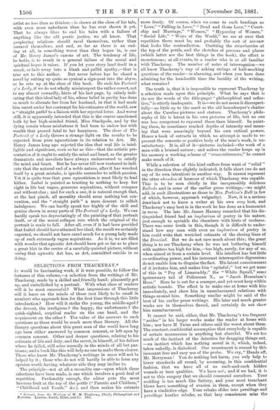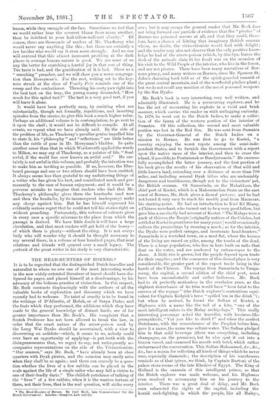SELECTIONS FROM THACKERAY.*
IT would be fascinating work, if it were possible, to follow the fortunes of this volume,—a selection from the writings of Mr. Thackeray, made by a skilled and friendly hand; pleasantly got up, and embellished by a portrait. With what class of readers will it be most successful ? What impressions of Thackeray will it leave on the minds of those (not likely to be small in number) who approach him for the first time through this little introduction? How will it strike the young, the middle-aged ? the devout, the irreligious ? the happy, the unfortunate ? the quick-sighted, sceptical reader on the one hand, and the acquiescent on the other ? The value of the answers to sneh questions as these would be much more than literary. All the literary questions about this great man of the world have long ago been either answered by common consent, or left open by common consent. Other and deeper questions, relating to his estimate of life and duty, and the secret, in himself, of his failure where he failed, still arise uneasily in the minds of all but par- tisans; and a book like this will help no one to make them clearer. Those who know Mr. Thackeray's writings in mass will not be helped by it ; those who do not will hardly be able to form any opinion worth having, whatever side they may incline to.
The principle—not at all a recondite one—upon which these selections have been made, is one which involves a good deal of repetition. Pardonably enough, the editor puts the most luscious fruit at the top of the pottle (" Parents and Children," " Childhood and Youth," &c.), and then makes his extracts
• Extracts from the Writings of W. M. Thackeray, Chiefly Philosophical and Reflective. London: Smith, Elder, and Co. 1881.
more freely. Of course, when we come to such headings as " Love," " Falling in Love," " Dead and Gone Lore," " Court- ship and Marriage," " Women," " Hypocrisy of Women," " Social Life," " Ways of the World," we see at once that repetition there must be, and probably the sort of see-saw that looks like contradiction. Omitting the strawberries at the top of the pottle, and the sketches of persons and places (which latter are the best things in the book), the effect is monotonous ; at all events, to a reader who is at all familiar with Thackeray. The number of notes of interrogation—we all know Thackeray's way of asking strings of half-mocking questions of the reader—is alarming, and when you have done admiring for the hundredth time the lucidity of the writing, what remains?
The truth is, that it is impossible to represent Thackeray by a selection made upon this principle. What he says that is (to use the words of the title-page) " philosophical and reflec- tive," is utterly inadequate. It is—we do not mean it disrespect- fully—as little up to the mark as the old housekeeper's chatter about the Carabas pictures and statues. Thackeray's philo- sophy of life is latent in his own pictures of life, but no one was less competent to expound these than himself. In paint- ing them, he sometimes reached depths of intensity and mean- ing that were amusingly beyond his own critical powers. Hence a book of extracts in which no attempt is made to re- present the concrete or positive body of the man's work, is un- satisfactory. It is, all of it—pictures included—the work of a man. with a bruised nature ; and unless the reader keeps up in his memory a working scheme of " cross-references," he cannot make much of it.
While a selection of this kind suffers from want of " relief " in the direction thus slightly indicated, it falls short (we do not say of its own intention) in another way. It cannot represent the utter abandon of humour of which Thackeray was capable. This is to be seen chiefly in the inexpressibly delicious Ballads and in some of the earlier prose writings,—we might add, in such illustrations as those to Mrs. Perkins's Ball (a few of which, however, approach vulgarity). Now, it is a serious drawback not to know a writer at his own easy best, and Thackeray's easy best is in the work he has done as a humonrist in verse. The late Mr. James Hannay remarked that his dis- tinguished friend had an inipluviunt of poetry in his nature, just enough to sprinkle the chambers with hints of coolness. There was some truth in this, though it is difficult to under- stand how any man with even an impluvium of poetry in him could write that wretched estimate of the closing lines of the Dunciad. But we do not care much about this ; the great thing is to see Thackeray when he was not bothering himself with matters too high for him,—too high, Barely, for any of us, when aimed at from a certain level. His intellect has but little co-ordinating power, and his incessant interrogative digressions do not enable him to disguise the fact. His latent consciousness of it irritates him, and makes him " spiteful ;" but we get none of this in " Peg of Limavaddy," the " White Squall," some igstrawnary tail of Policeman X., or " Jacob Homnium's Hoss." Here he is out for a scamper, and yet must keep within artistic bounds. The effect is to make one at home with him immediately, and show him in unembarrassed relations with things around him. Something similar might be said of the best of his earlier prose writings. His later and much greater works are in themselves flawed, and certainly do not show him unembarrassed.
It cannot be said, either, that Mr. Thackeray's too frequent " asides " in his larger works make the reader at home with him ; nor have M. TaMe and others said the worst about them. The constant, confidential assumption that everybody is capable of certain meannesses is anything but cheerful. We see too much of the instinct of the detective for dragging things out, —an instinct which has nothing moral in it, which, indeed, taken nakedly, is diabolical. Our resentment is roused by this incessant free and easy use of the probe. We cry, " Hands off, Mr. Merryman ! You do nothing but harm, you only help to lower standards all round, by assuming, in this confidential fashion, that we have all of us such-and-such hidden wounds or base qualities. We have not ; and if we had, it is not to this surgery that we should commend ourselves. Your scolding is too much like flattery, and your most trenchant blows have something of evasion in them, except when they have a vindictive edge. Your rebuke slides into persiflage and persiflage hustles rebuke, so that lazy consciences miss the
lesson, while they smuggle off the fun. Sometimes we feel that we would rather bear the severest blame from many another, than be indebted to your hail-fellow-well-met charity." Of course, there are thousands of readers of Mr. Thackeray who would never say anything like this ; but there are certainly a few besides who would say it even more strongly. And no one will contend that this almost incessant prodding at the dark places in average human nature is good. We are none of us any the better for snatching a fearful joy in that sort of thing. The taste is bad, and the gratification of it is bad. Show us a " searching" preacher, and we will show you a worse congrega- tion than Honeyman's. For the rest, writing set to the key- note struck at the close of Vanity Fair reminds one of the sweep and the confectioner. Thrusting his sooty paw right into the best tart on the tray, the young scamp demanded, " How much for this spiled tart ?" The tart is a very good tart, if you will leave it alone.
It would have been perfectly easy, by omitting what are substantially, though not formally, repetitions, and inserting episodes from the stories, to give this book a much higher value. Perhaps an additional volume is in contemplation, to go next to it upon the shelf ; it would not be difficult to compile. At all events, we repeat what we have already said. By the side of the problem of life, as Thackeray's peculiar genius impelled him to state it, his " philosophy " and " reflections " are little better than the rattle of peas in Mr. Merryman's bladder. In quite another sense than that in which Wordsworth applied the words to Milton, we may say of Thackeray, as a painter of life, " Soul awful, if the world has ever known an awful soul." He cer- tainly is not awful in this volume, and probably the intention was to make him as inviting as possible. If so, however, the Blue- beard passage and one or two others should have been omitted. It always seems less than grateful to say unflattering things of a writer who has given his best, and contributed much and per- manently to the sum of human enjoyment ; and it would be a perverse mistake to imagine that readers who find that Mr. Thackeray's philosophy gives them the heartache (and now and then the headache, by its inconsequent inadequacy) make any charge against him. But he has himself expressed his evidently serious regret that he could not tell his stories right on without preaching. Fortunately, this volume of extracts gives in every case a specific reference to the place from which the passage is derived. We have little doubt it will have a large circulation, and that most readers will get hold of the honey— of which there is plenty—without the sting. It is not every- body who will wonder why it should be thought necessary to say several times, in a volume of four hundred pages, that near relations and friends will quarrel over a small legacy. The portrait of the great writer in his study is very characteristic.



































 Previous page
Previous page